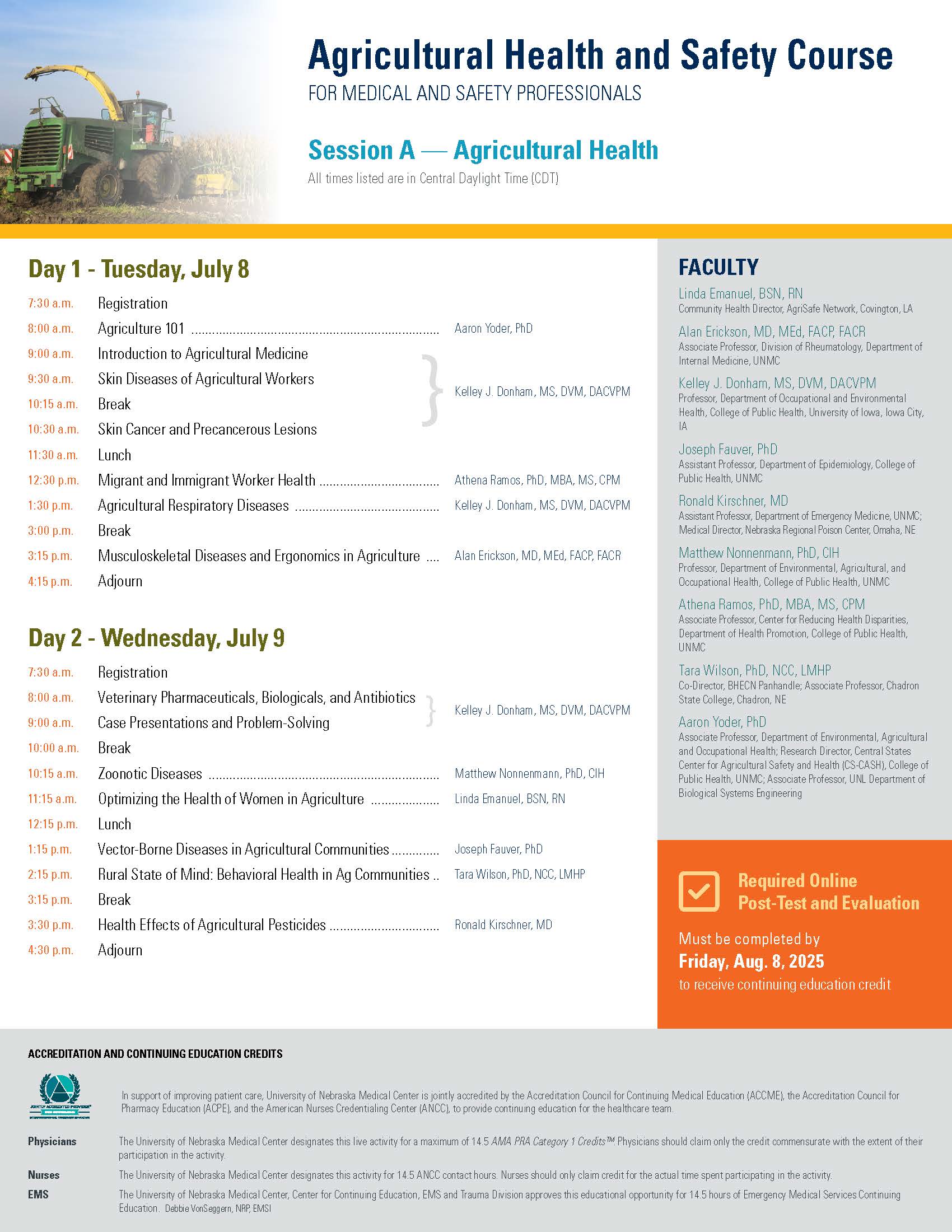Session A: Agricultural Health (July 8-9)
You have until Aug. 8, 2025, to complete all of the session requirements to receive continuing education credit. No exceptions!
At the conclusion of this session, participants should be better able to:
- Assess the nature of agriculture in Nebraska, including crop production, animals, and workforce unique to the region.
- Differentiate the objectives and philosophies of rural health and agricultural medicine.
- Investigate the most common types of infectious dermatitis and contact dermatitis found in the farm population.
- Assess the signs, symptoms, causes and prevention strategies of skin cancer in rural residents.
- Describe health care challenges and services available for migrant and immigrant workers.
- Assess the main respiratory diseases commonly found in agricultural workers, their symptoms, diagnosis, treatment, and prevention recommendations.
- Evaluate the screening methods and diagnostic tools utilized to determine the differences between muscular, disc and joint patterns of low back pain.
- Analyze the hazardous risks of biologicals, pharmaceuticals, and antibiotics used in livestock production and strategies for their prevention and treatment.
- Interpret the signs, symptoms, and treatment options of common zoonotic diseases in humans.
- Apply agriculture-related case reports.
- Contrast the hazards faced by women working in agriculture.
- Articulate the health risks posed to agricultural workers by vector borne diseases.
- Describe behavioral and mental health challenges faced by persons living in farming communities.
- Distinguish between the major types of pesticides, how people are exposed, symptoms of poisoning, diagnosis, and treatment of pesticide poisoning.

Click the image to view the information
Read the UNMC CCE Disclosure Declaration Policy
Disclosures
The accredited provider has mitigated and is disclosing identified relevant financial relationships for the following faculty, planners, and others in control of content prior to assuming their roles.
FACULTY
The following has disclosed relevant financial relationships:
- Matthew Nonnenmann, PhD, CIH
Consultant: Atwood Law, Laura Kauth, Texas A&M University
The following have nothing to disclose:
- Kelley J. Donham, MS, DVM, DACVPM
- Linda Emanuel, BSN, RN
- Alan Erickson, MD, MEd, FACP, FACR
- Joseph Fauver, PhD
- Ronald Kirschner, MD
- Athena Ramos, PhD, MBA, MS, CPM
- Tara Wilson, PhD, NCC, LMHP
- Aaron Yoder, PhD*
PLANNING COMMITTEE
The following have nothing to disclose:
- Valeta Creason-Wahl, HMCC
- Ellen Duysen, MPH, COHC
- Tori Greenlee
- Julie Huglin
- Heidi Keeler, PhD, MSN/MBA, RN
- Renee Paulin, MSN, RN, CWOCN
- Risto Rautiainen, PhD, MS
- Debra J. Romberger, MD
- Debbie VonSeggern, NRP, EMSI
*Faculty and planning committee member
To receive continuing education credits, you must:
- Check in and attend the live activity.
- Complete the online post-test (open-book, with 70% accuracy) and course evaluation.
- On your dashboard, click Evaluate an Activity.
- Enter the appropriate Activity Code:
If you attended In-Person: 64869
If you attended via Livestream: 64870
You have until Aug. 8, 2025, to complete the post-test and evaluation to claim credit for this activity.
Your certificate will be saved in your UNMC MyCCE account under Certificates & Transcripts.
Need help managing your MyCCE account? Find answers to commonly asked questions about signing in to the portal, completing the online evaluation, retrieving your certificate, and more. Go to Manage MyCCE Account